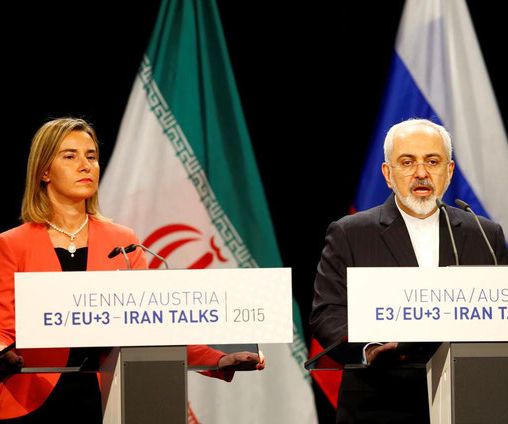 US President Donald Trump’s pullout declaration from the multilateral nuclear deal with Iran is tantamount to a declaration of war in the Middle East, which would lead to the change of the regime in Tehran. However, the EU-American rift over the deal would weaken the sanctions on Iran if imposed.
US President Donald Trump’s pullout declaration from the multilateral nuclear deal with Iran is tantamount to a declaration of war in the Middle East, which would lead to the change of the regime in Tehran. However, the EU-American rift over the deal would weaken the sanctions on Iran if imposed.
But why are American allies in the EU opposing deal pulling? It can be attributed to changing political alignments in the Middle East region after the 2011 Arab Spring, and the Western drive to reach a deal that serves EU interests as many of the European states have been undergoing rigid economic conditions. These factors prompted the EU to sign the deal alongside China and Russia in 2015.
However, the agreement has not changed Iran’s behavior and that former US President Barrack Obama’s administration was pathetic in signing such a deal along with the UK, Russia, China, France, and Germany.
The Americans have sought to ignite fire under Iranian feet by pushing the government into new negotiations with new rules and conditions while Europeans have sought to keep the agreement and to add some amendments to the deal. The EU has repeatedly declared support for the deal, rejecting American pugnaciousness and confrontational attitude.
The EU advocacy for the deal stems from economic and commercial factors as Europeans fear unexpected hindrances and obstacles to affect their penetration to the Iranian market. Thus, the EU states give priority to economic interests in the Iranian market to secure more commercial contracts. However, political, security and human rights files, are less important to them compared to Americans.
If there is no win-win formula for the EU, it is not expected that the EU would ever accept any amendments to the deal
– Shehab Al-Makahleh
Geopolitical factor
While Washington focuses on keeping the geopolitical factor in the Middle East unchanged, rejecting Iranian expansionist policies, opposing Iranian hiking influence in the region which threatens stability of the Middle East, and countering Tehran’s support for armed movements and militias in Arab countries, the EU turns deaf ear to this risk.
Thus, Trump’s administration calls on Tehran to set aside its expansionist agendas before talking about any economic openness. At the same time, the US urges the EU to follow the American approach when opening dialogue with the Iranian government; in other words, not to prioritise their economic and commercial requirements to political and military ones.
The EU sounds not interested in the Middle East issues and concerns are only restricted to economic regardless of the repercussions and ramifications to the Middle East region.
To date, Trump seems to have achieved a partial victory; however, this can be a double edge weapon that can backfire against American interests any moment. He has been able to move the European rhetoric machine against Iran at some point vis-à-vis Tehran’s political and military interventions in the Middle East and with regard to Iranian ballistic missiles.
The question remains whether American pullout of the nuclear agreement cause rift between the US and the EU? It has been clear that since Israeli Prime Minister Benjamin Netanyahu's presentation of documents related to Iranian nuclear program about Tehran’s breach of the nuclear agreement, Trump and his hawkish administration have taken their decision to cancel the deal and started to discuss scenarios of imposing sanctions on Iran.
Some experts believe that Trump has given a precious gift to the Supreme Leader of Iran and the hawks of the Iranian government because he ended the power of the reformers and the Iranian opposition. Both the hawks and the hardliners in Iran have been awarded a golden opportunity and would have in the near future the upper hand to Hassan Rouhani and his reformist wing.
Trump’s decision was not a surprise as he previously announced that the multilateral deal was an unmitigated disaster which has not taken into consideration the Iranian ballistic missile and its other military capabilities.
The rift between the EU and the US over the deal is that any sanctions on the Iranian economy will harm the European markets, which have won many contracts in Iran after the 2015 deal. Thus, Trump's declaration could harm investor’s confidence in Iran and freak out larger businesses to get out of Iranian volatile market.
Apparently, Tehran and Washington have no economic or commercial ties at present; however, this is not the case with the European partners as they seek to maintain Iranian economy vibrant and buoyant.
Why the EU, China and Russia support the deal?
Trump has pulled out of the deal leaving the EU, Russia, China and the UK at stake to negotiate a new deal that better serves their interests in Iran. Statistics show that trade exchange between the EU and Iran reached $9.5 billion in 2015, hiked to $17 billion in 2016. In 2017, trade exchange recorded $25 billion.
The major companies benefitting from Iran are French, Dutch and German including Total, Airbus, Renault and Shell amongst others. China, on the other hand, is deemed the largest trade partner to Iran. In 2017, trade turnover between Iran and China stood at US$38 billion, accounting 23 per cent of Iran’s total trade. Russian Iranian total trade amounted to US$1.8 billion in 2017.
If there is no win-win formula for the EU, it is not expected that the EU would ever accept any amendments to the deal.
However, China and Russia will gain more from the pullout of the Americans from the multilateral nuclear deal as this will give both Moscow and Beijing diplomatic leverage over Washington’s as both capitals would present themselves as the credible mediator to fill the vacuum of the US in the Middle East.
Article published in Al Arabiya: https://english.alarabiya.net/en/views/news/middle-east/2018/05/25/Reasons-behind-US-EU-rift-over-Iran-nuclear-deal.html












